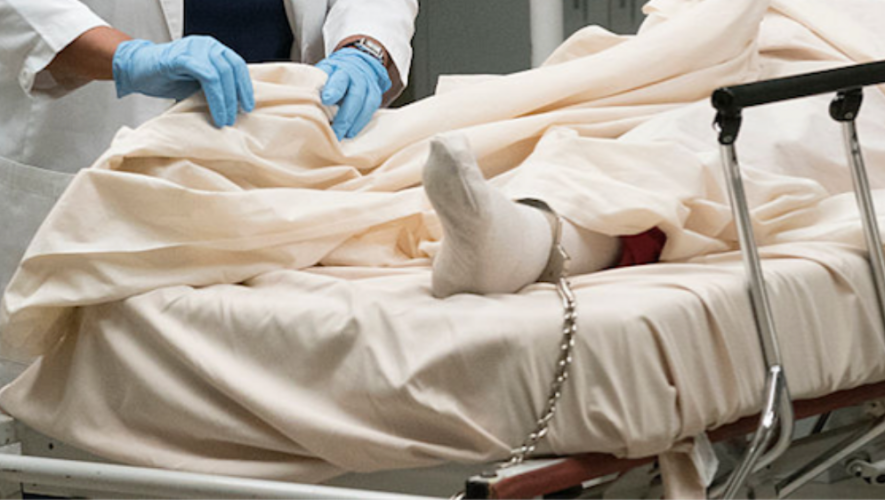Tiana Hill was excited to welcome a child into the world. It’s hard to stay optimistic in prison, but Hill—a nonviolent offender incarcerated for violating probation—found hope in the future of her child. Yet, the prison system’s failure to provide healthcare killed her innocent baby four days postpartum. Going into labor, Hill pleaded with the prison guards to take her to the hospital. They refused. Hill lay in her blood for upwards of twelve hours in the prison infirmary, shackled and alone.
United States prisons regularly separate newborns from their imprisoned mothers and withhold prenatal care for incarcerated women. To support incarcerated women and their children, the US government should guarantee and protect their right to prenatal care, and construct more prison nurseries nationwide.
Punishing Women for Pregnancy
Approximately 231 thousand women are currently incarcerated, and around 5 to 10 percent are or become pregnant during their time in prison. But the American healthcare and prison systems work together to restrict their access to prenatal care. Almost half of pregnant women behind bars report receiving no prenatal care. Even when just the father is incarcerated, a woman’s access to prenatal care will falter due to a lack of support and the hardships of single motherhood. This policy punishes women and their children. Babies whose mothers do not receive prenatal care are five times more likely to die in infancy than babies whose mothers do.
In Estelle vs. Gamble, the Supreme Court ruled that the Eighth Amendment protects prenatal care as it stipulates that there should not be inflictions of unnecessary pain. Yet, there are no federal standards to ensure women get the medical attention that they are constitutionally entitled to.
Prison births are inhumane. Many women report that guards shackled them to hospital beds while pushing their baby out, or, in some cases, denied them transport to a hospital. Only twenty two states have a policy that bans handcuffing women to beds.
Some argue that women could exploit pregnancy or labor to escape prison, but handcuffing women to beds is often unnecessary: the vast majority of pregnant prisoners are nonviolent offenders and childbirth is a painful experience that makes escape essentially impossible.
By denying moms necessary care, prisons create obstacles for their children and contribute to an endless loop of poverty or imprisonment. Children born to incarcerated mothers are more likely to experience depression and anxiety and are more likely to drop out of school than children born to free moms. A child separated from their mother post-birth (a common prison practice) is more likely to face low self-esteem, difficulty coping with stress, and less successful relationships. Before being born, the American system sets these children up for failure.
On average, the government allows a mother who is incarcerated at the time of birth twenty-four hours with her newborn before police take the child away.
Prison Nurseries Protect Women
Eight American states are pushing back. They allow a mother to raise her child while finishing her sentence with prison nursery systems—a controversial, yet advantageous program.
The “Wee Ones” program is a charity-funded operation at the Indiana Women’s Prison. It allows a select group of women to live in separate dorms with their newborn babies. Many strict stipulations—related to their cause for imprisonment and the duration of their sentence —determine which mothers get to raise their babies behind bars. For instance, the mother must be a non-violent offender and cannot have a sentence over eighteen months. Women who complete the program are less likely to reenter the prison system and feel more confident as mothers due to training and support.
Critics claim that not all mothers adhere to the rules of prison nursery programs by fighting and battling over turf, which can create stressful environments for children. While this may be true, most prison nurseries give mothers independent rooms and hire staff to prevent long-term conflicts. Prison nurseries are also constantly developing techniques for re-educating and evaluating mothers. These mothers show a 37 percent lower recidivism rate relative to women outside the nursery programs, demonstrating that the prison nursery system leads to self-growth.
Justice for Incarcerated Moms
The Institute for Family Studies argues that when a child grows up, they may experience feelings of shame when they recollect that the first years of their life were spent in prison. However, these arguments fail to consider the psychological traumas that result from being in the foster system or separated from one’s mother.
Moreover, most prison nursery systems expire once the child is around two years old; studies report that children’s earliest memories are formed at two and a half years old. A child will not grow up with any memory of living in prison, and most of their life will be outside, connected with their mother. In 2015, Cayesha Shivers graduated with her son, Kori, from the longest running prison nursery system, Bedford Hills Correctional Facility in New York. She reflects that her time taught her what true mothering looked like, despite having older children who she didn’t birth in prison.
As the number of women behind bars rises, we need more policies that protect women’s rights. To address the unjust care of pregnant and incarcerated women, we must educate healthcare workers on the value of prenatal care, provide funding for prison nurseries, and reform birthing conditions in prisons and jails with initiatives like the Justice for Incarcerated Moms Act of 2021 (JIMA). This act would address healthcare worker education and nursery funding while also expanding prenatal care, including improved nutrition and regular medical visits. JIMA would promote equity and dignity for incarcerated mothers and remind society that, no matter the circumstance, women deserve basic rights.



